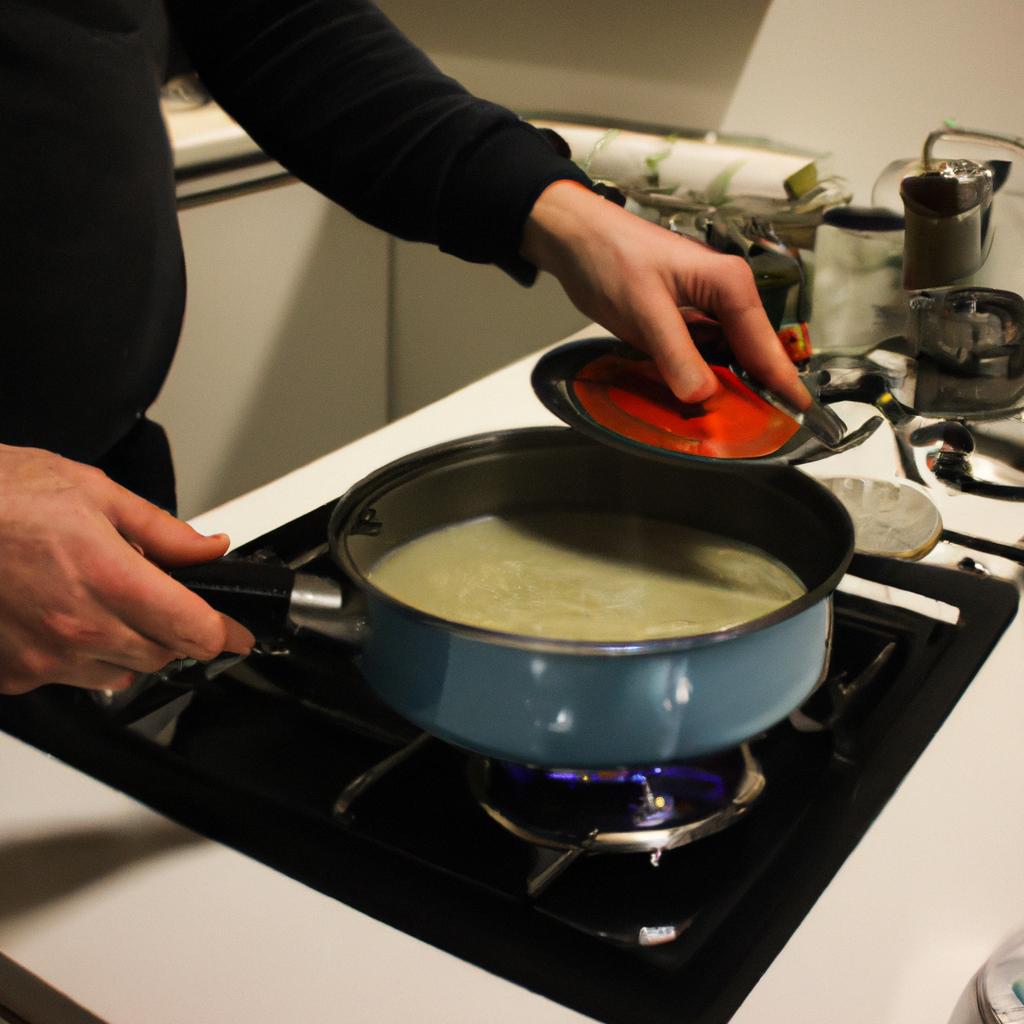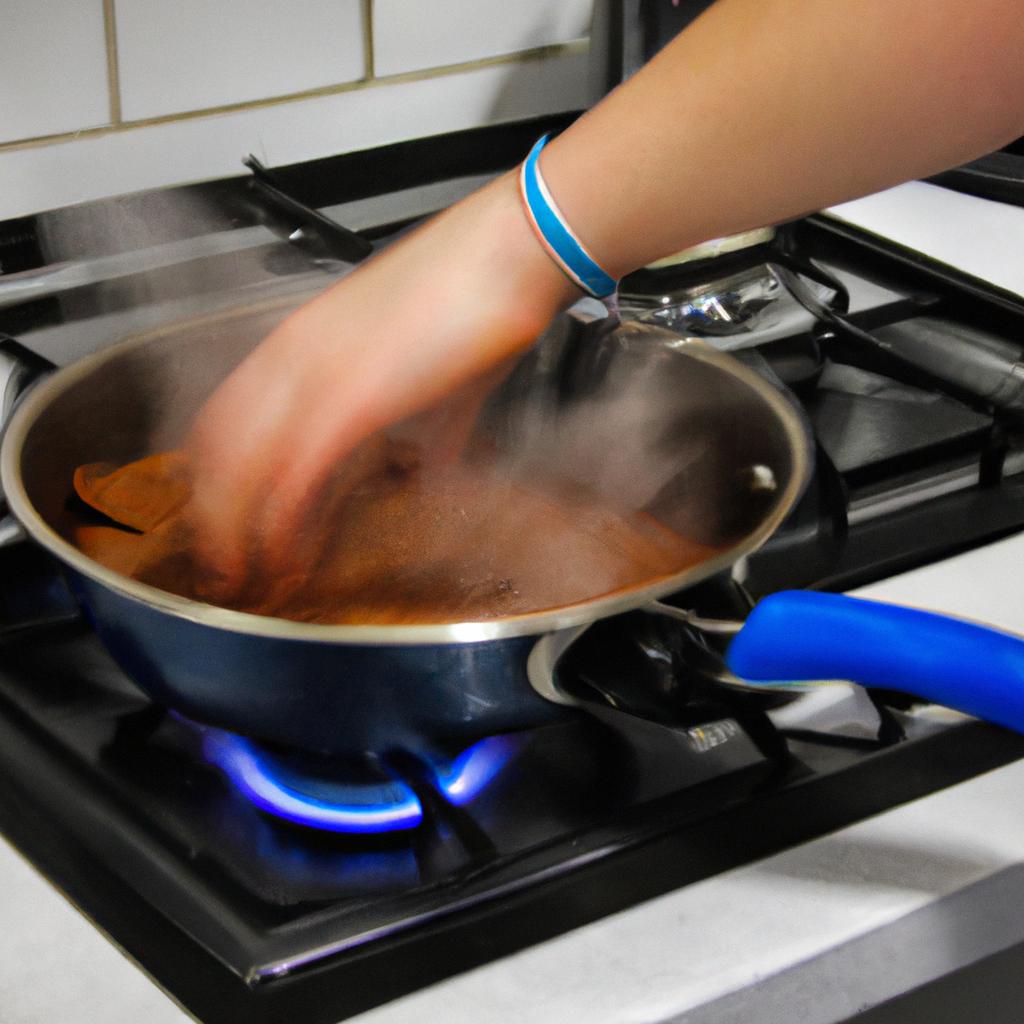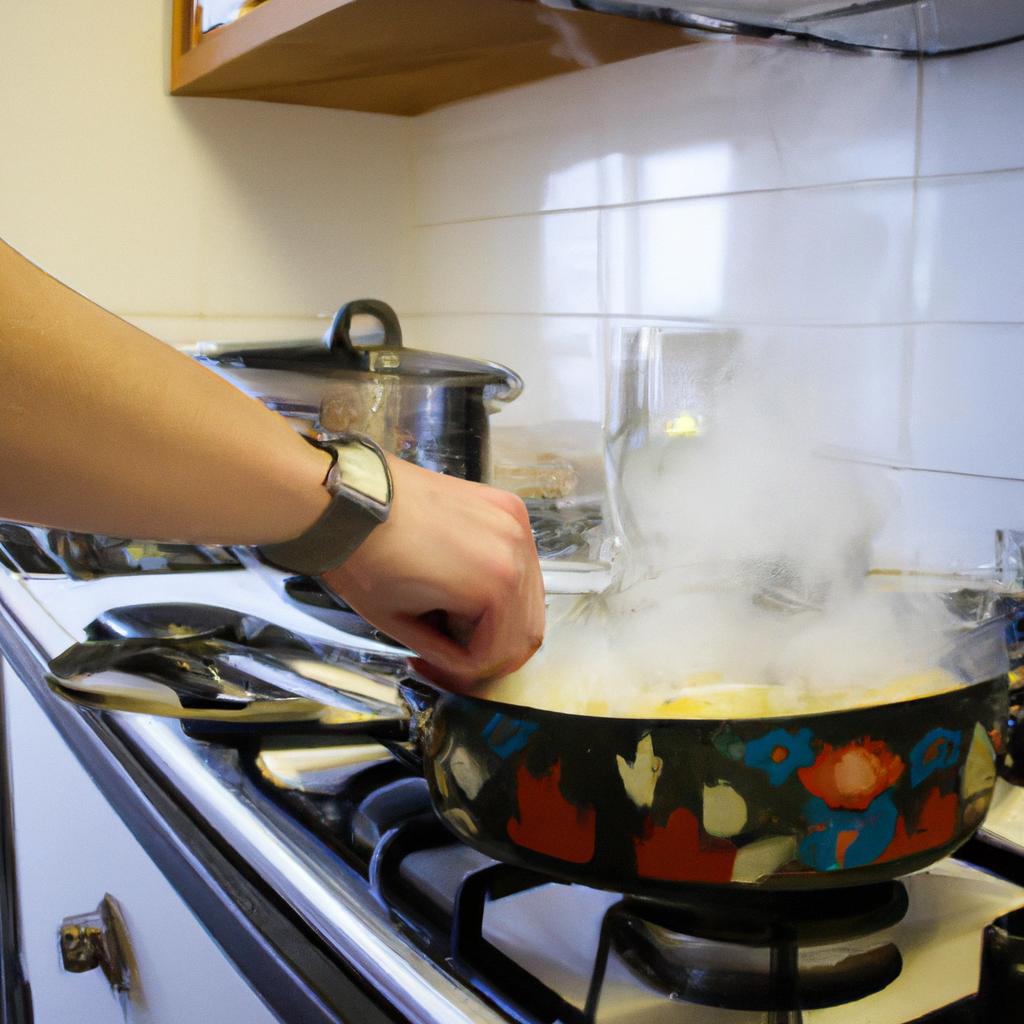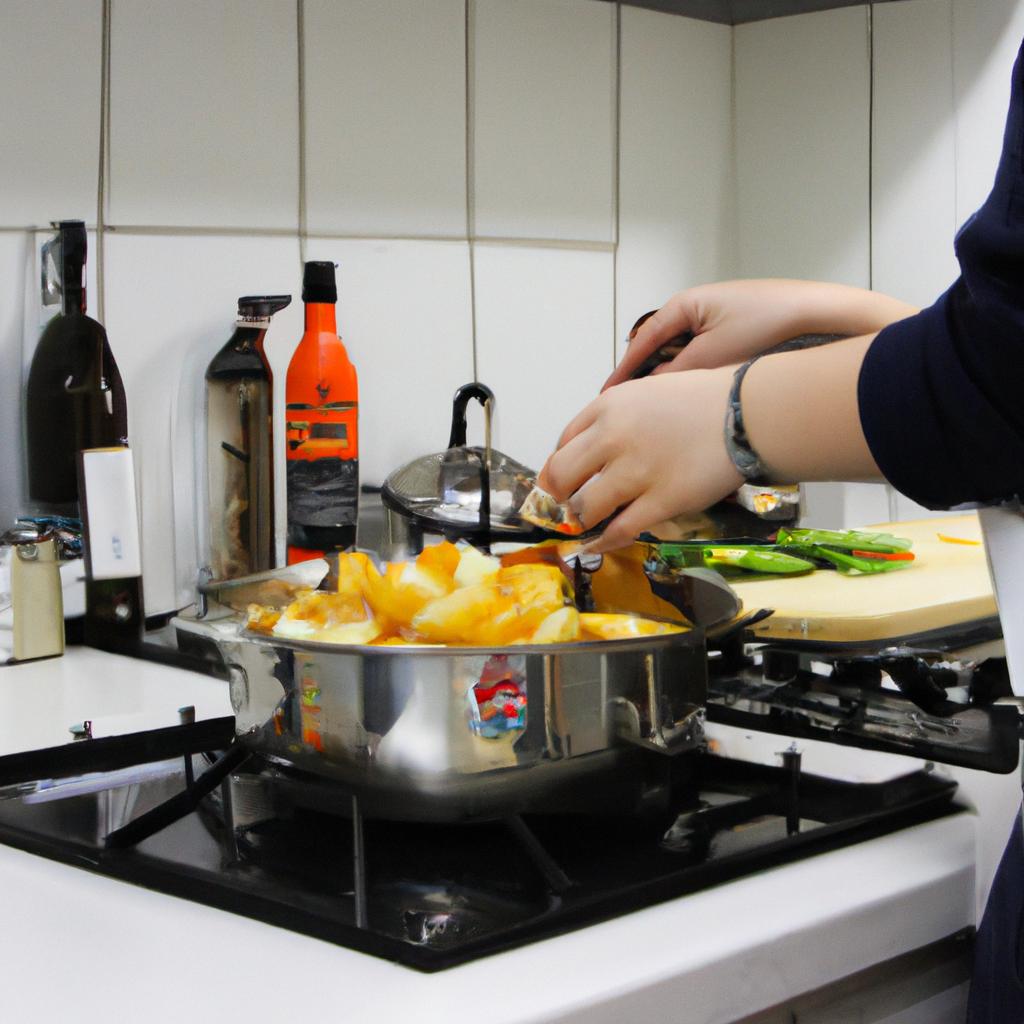In recent years, the culinary industry has experienced significant growth and innovation, leading to an increased demand for skilled professionals in the field. However, pursuing a career in the culinary arts can be financially challenging, as it often requires substantial investment in education and training. Fortunately, there are various grants available specifically designed to support aspiring culinary students in their educational journey. This article will explore the funding opportunities that exist for culinary students interested in recreation and food studies.
For instance, consider the hypothetical case of Sarah, a passionate individual who dreams of becoming a renowned pastry chef. Despite her talent and dedication to perfecting her craft, Sarah faces financial obstacles that hinder her from pursuing formal training at a reputable institution. In this scenario, grants tailored towards culinary students specializing in recreation and food could play a crucial role in making Sarah’s dream attainable. By understanding the different types of grants available and how to navigate through application processes effectively, individuals like Sarah can access valuable financial resources that not only alleviate some of the burdens associated with education costs but also provide opportunities for personal advancement within the culinary industry.
Types of grants available for culinary students
Types of Grants Available for Culinary Students
One example of a grant available to culinary students is the Johnson & Smith Culinary Arts Grant. This grant provides financial assistance to aspiring chefs pursuing their education at Johnson & Smith University, enabling them to focus on honing their skills in the culinary arts. Such grants serve as crucial support systems for individuals passionate about pursuing a career in the culinary industry.
To better understand the various opportunities available, let us explore different types of grants that can assist culinary students in achieving their educational and professional goals:
- Need-Based Grants: These grants are awarded based on an applicant’s demonstrated financial need. They provide essential funding to those who may not have sufficient means to pursue higher education independently.
- Merit-Based Grants: Merit-based grants recognize outstanding achievements and academic excellence among applicants. They reward exceptional talent and dedication exhibited by culinary students throughout their educational journey.
- Organization-Specific Grants: Many organizations dedicated to promoting careers in the culinary field offer grants targeting specific groups or causes within this sector. For instance, some grants may be exclusively available for women or minority students seeking opportunities in the food industry.
- Project-Based Grants: These grants support innovative projects or research initiatives undertaken by culinary students. Funding is provided to encourage creativity and exploration within the realm of food-related studies.
| Types of Grants | Description |
|---|---|
| Need-Based | Awarded based on demonstrated financial need |
| Merit-Based | Recognizes outstanding achievements and academic excellence |
| Organization-Specific | Targets specific groups or causes within the culinary field |
| Project-Based | Supports innovative projects or research initiatives |
By offering a diverse range of options, these grants aim to address both financial barriers and foster innovation within the culinary community, allowing talented individuals to thrive in fulfilling their aspirations.
Moving forward, it is important to understand eligibility criteria for these valuable grants that can support aspiring culinary students in their educational endeavors.
Eligibility criteria for culinary student grants
Types of grants available for culinary students
In the pursuit of a career in the culinary arts, aspiring chefs and food enthusiasts often seek financial assistance to support their education. Various types of grants are available specifically tailored to meet the needs of culinary students. One such grant is the “Culinary Excellence Scholarship” offered by The Culinary Institute of America (CIA), which provides funding opportunities for outstanding culinary students.
To better understand the different options available, let’s explore some common types of grants that culinary students can apply for:
-
Merit-based Grants: These grants are awarded based on academic achievements or other exceptional qualities demonstrated by an applicant. For instance, the James Beard Foundation offers merit-based scholarships to deserving individuals who have displayed excellence and passion in their culinary pursuits.
-
Need-based Grants: Designed to assist students with limited financial resources, need-based grants consider an individual’s income level when determining eligibility. Organizations like Share Our Strength provide need-based scholarships aimed at ensuring talented individuals from economically disadvantaged backgrounds can pursue their culinary dreams.
-
Industry-specific Grants: Some grants cater specifically to students pursuing specialized areas within the culinary field. For example, organizations like Les Dames d’Escoffier International offer scholarships targeted towards women seeking careers in various aspects of food, including gastronomy, wine, hospitality management, and more.
-
Community Grants: Many local communities also offer grants to support budding talent within their region’s culinary landscape. These community-focused initiatives aim to foster growth and development while uplifting aspiring chefs who are passionate about making a positive impact closer to home.
Consider this real-life scenario: John Doe, a high school graduate with a burning desire to become a pastry chef, applies for multiple grants targeting his area of interest. He successfully secures one merit-based scholarship from a prestigious culinary institute and receives additional financial aid through a community grant program designed exclusively for promising pastry artists.
| Grant Name | Eligibility Criteria | Amount Awarded ($) |
|---|---|---|
| Culinary Excellence Scholarship | Outstanding academic record in culinary arts | up to $10,000 |
| James Beard Foundation | Demonstrated excellence and passion in cooking | varies |
| Share Our Strength | Limited financial resources | varies |
These grants not only alleviate the financial burden but also serve as a recognition of an individual’s dedication and talent. By offering support tailored to different circumstances, they enable culinary students from various backgrounds to pursue their dreams.
Transitioning seamlessly into the subsequent section about “How to apply for funding as a culinary student,” prospective applicants can now learn more about the application process and further steps necessary to secure these valuable grants.
How to apply for funding as a culinary student
Eligibility criteria for culinary student grants can vary depending on the funding organization or scholarship program. While each opportunity may have its own specific requirements, there are some common factors that most culinary students must meet to be eligible for these grants.
One such example is the “Taste of Success” grant offered by the Culinary Education Foundation (CEF). To qualify for this grant, applicants must be enrolled in an accredited culinary arts program and demonstrate financial need. Additionally, they should showcase a strong passion for culinary arts through their academic achievements and involvement in relevant extracurricular activities.
When applying for funding as a culinary student, it is essential to carefully review and fulfill all eligibility criteria specified by the granting institution or program. Here are four key points to consider:
-
Academic Standing: Many grants require applicants to maintain a minimum GPA throughout their studies. This criterion ensures that funds are awarded to dedicated and committed individuals who excel academically.
-
Financial Need: Demonstrating financial need is often crucial when applying for grants. Institutions want to support students who may not have sufficient resources to pursue their culinary education without assistance.
-
Program Requirements: Some grants might prioritize students enrolled in specific programs or courses related to food industry management, nutrition, or hospitality. It’s important to align your chosen program with the objectives of the funding organization.
-
Personal Statement/Essay: Grant applications frequently include essay questions or personal statements where applicants can highlight their motivation, career aspirations, and how receiving the grant would contribute to their educational journey.
To better understand these eligibility criteria, let us look at a table showcasing different scholarships along with their respective requirements:
| Scholarship Name | Eligibility Criteria |
|---|---|
| Chef’s Delight | Minimum 3.0 GPA; Enrolled in a recognized culinary arts program |
| Food For Thought | Demonstrate financial need; Pursuing a degree in food science or nutrition |
| Taste of Success | Financial need; Enrolled in an accredited culinary arts program |
| Hospitality Hero | Minimum 2.5 GPA; Pursuing a degree in hospitality management |
These examples illustrate the diversity of criteria that can affect eligibility for culinary student grants. Aspiring applicants should meticulously review each opportunity’s requirements and tailor their applications accordingly.
Moving forward, let us explore some of the top funding organizations supporting culinary education without delay.
Top funding organizations supporting culinary education
Having discussed the process of applying for funding as a culinary student, let us now explore some of the top funding organizations that support culinary education. Before delving into these opportunities, let’s consider an example to illustrate how grants can positively impact aspiring culinary students.
Example: Meet Sarah, a passionate culinary student with dreams of becoming a renowned chef. Despite her dedication, Sarah faces financial constraints that hinder her from pursuing her education at a reputable culinary school. However, through diligent research and assistance from various funding organizations, Sarah successfully secures a grant that covers her tuition fees and provides additional resources to enhance her learning experience.
Paragraph 1:
Attaining financial aid is crucial for many culinary students seeking higher education or specialized training in the field. Numerous funding organizations recognize the value of investing in future chefs and offer grants specifically designed to support their educational journey. These grants often cover tuition costs, provide mentorship programs, fund internships, or supply necessary equipment. By providing such opportunities, these organizations aim to nurture talent and encourage diversity within the field of gastronomy.
Below are four key reasons why securing grants plays a vital role in empowering aspiring culinary students:
- Financial Assistance: Grants alleviate the burden of high tuition fees and living expenses, enabling students to focus on honing their skills without excessive financial stress.
- Access to Resources: Many grants come bundled with access to state-of-the-art facilities, cutting-edge technology, libraries stocked with cookbooks and industry journals, and online platforms offering valuable educational materials.
- Networking Opportunities: Some funding organizations facilitate networking events where scholars can connect with established professionals in the food industry. This exposure opens doors for potential apprenticeships or employment prospects upon graduation.
- Skill Development Programs: Grants often provide funds for additional skill-building workshops, seminars by expert chefs, or participation in prestigious competitions. Such experiences boost confidence and expand knowledge beyond the traditional classroom setting.
Paragraph 2:
To further illustrate the range of funding opportunities available, consider the following table showcasing three prominent organizations that offer grants for culinary students:
| Organization | Grant Name | Focus Area |
|---|---|---|
| James Beard Foundation | Culinary Scholarships | Supporting exceptional talent in various culinary fields. |
| Les Dames d’Escoffier International | Legacy Awards | Providing scholarships to women pursuing careers in food, beverage, and hospitality industries. |
| American Culinary Federation Education Foundation | Apprenticeship Grants | Sponsoring culinary apprenticeships through financial aid and mentorship programs. |
Table: Prominent Organizations Offering Grants for Culinary Students
These organizations represent just a fraction of the numerous funding opportunities available to culinary students. Each grant offers unique benefits tailored to specific educational needs and career aspirations.
With an understanding of how grants can transform aspiring culinary students’ lives, let’s now explore grants specifically geared towards supporting internships and apprenticeships in the next section.
Grants specifically for culinary internships and apprenticeships
Case Study: Emily, a passionate culinary student, wanted to gain hands-on experience in the industry by participating in an internship at a renowned restaurant. However, she faced financial constraints that made it difficult for her to pursue this opportunity. Fortunately, there are grants available specifically designed to support culinary students like Emily who aspire to undertake internships or apprenticeships.
These grants not only provide financial assistance but also offer valuable networking opportunities and mentorship programs. By securing one of these grants, aspiring chefs can enhance their skills and knowledge while working alongside experienced professionals in real-world kitchen environments. Let’s explore some funding organizations that offer grants specifically catered towards culinary internships and apprenticeships:
-
Culinary Institute of America (CIA) – CIA provides multiple scholarships and stipends for students pursuing internships or externships with top hospitality establishments worldwide. Additionally, they offer mentorship programs where successful applicants receive guidance from accomplished chefs during their internship period.
-
James Beard Foundation – Known for its commitment to nurturing young talent in the culinary field, the James Beard Foundation offers various scholarship opportunities for individuals interested in undertaking internships or apprenticeships. These scholarships aim to cover expenses related to living arrangements, transportation, and other costs associated with gaining practical experience.
-
National Restaurant Association Educational Foundation (NRAEF) – The NRAEF supports aspiring culinarians through its ProStart program, which facilitates paid internships at leading restaurants across the country. This program helps students develop essential skills required for success in the industry while earning wages.
-
American Culinary Federation Education Foundation (ACFEF) – ACFEF provides grant opportunities tailored specifically for culinary interns and apprentices. Their grants assist students with tuition fees, housing expenses, textbooks, and other necessary resources required during their placement.
By exploring these grant options dedicated exclusively to culinary internships and apprenticeships, aspiring chefs like Emily can pursue their dreams without worrying about financial barriers.
Next section: Tips for writing a successful grant application as a culinary student
Tips for writing a successful grant application as a culinary student
Grants specifically for culinary internships and apprenticeships provide valuable funding opportunities for aspiring culinary students to gain hands-on experience in the field. These grants aim to support individuals who are passionate about pursuing a career in the culinary arts by providing financial assistance during their training period. One such example is the Culinary Internship Grant offered by the Culinary Arts Foundation, which provides financial support to culinary students seeking internship opportunities at renowned restaurants or hotels.
Obtaining a grant for a culinary internship or apprenticeship can be highly competitive. Therefore, it is crucial for applicants to present a well-crafted grant application that highlights their skills, passion, and dedication towards the culinary arts. Here are some tips to help you write a successful grant application as a culinary student:
-
Research: Before applying for any grant, thoroughly research the organization offering the opportunity and understand their mission and values. Tailor your application accordingly to align with their objectives.
-
Showcase Experience: Highlight any relevant experience you have gained in the past, including participation in cooking competitions, volunteer work at food festivals, or previous internships/apprenticeships. Emphasize how these experiences have contributed to your growth as a budding chef.
-
Clearly Define Goals: Outline your short-term and long-term goals within the culinary industry. Explain how this particular internship or apprenticeship will help you achieve those goals and contribute to your professional development.
-
Demonstrate Passion: Convey your enthusiasm and love for cooking throughout your application. Use vivid language to describe memorable dishes you have created or share personal anecdotes that illustrate your commitment to honing your craft.
To further assist you in understanding different grants available for culinary students interested in internships or apprenticeships, below is an emotional bullet point list highlighting key benefits of these funding opportunities:
- Financial security during internship/apprenticeship
- Exposure to experienced chefs and mentors
- Access to state-of-the-art kitchen equipment
- Networking opportunities within the culinary industry
Additionally, refer to this emotional table that presents a comparison of different grants for culinary internships and apprenticeships:
| Grant Name | Eligibility | Funding Amount | Application Deadline |
|---|---|---|---|
| Culinary Arts Foundation’s Culinary Internship Grant | Culinary students pursuing internships at renowned restaurants or hotels | Up to $5,000 | June 30th |
| Chef Apprenticeship Grants | Aspiring chefs entering apprenticeship programs | Varies based on program | Rolling basis |
| James Beard Foundation Scholarship Program | Undergraduate and graduate culinary students | Varies based on scholarship type | May 15th / November 1st |
By following these tips and utilizing available grant opportunities, you can enhance your chances of securing funding for a valuable culinary internship or apprenticeship. Remember to carefully review all application requirements and deadlines, as well as submit any additional documents required by the granting organization. Good luck!
 Refoksa
Refoksa



